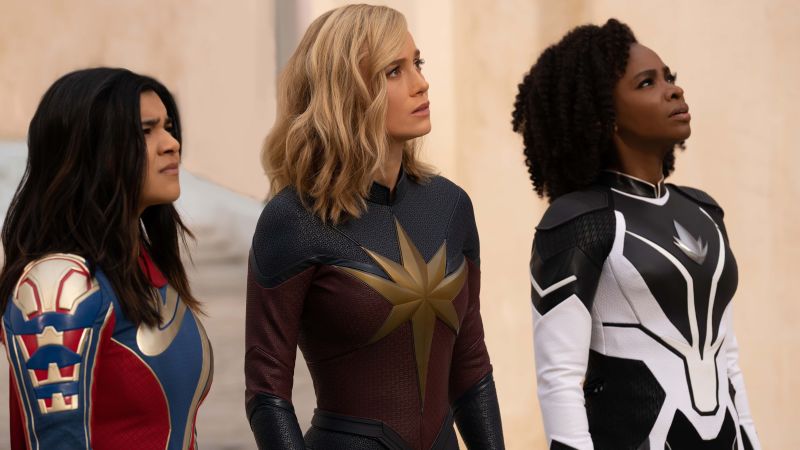Editor’s Note: A version of this article first appeared in the “Reliable Sources” newsletter. Sign up for the daily digest chronicling the evolving media landscape here.
Disney has a mess on its hands to marvel at.
Its $200 million-plus “The Marvels” bombed at the box office over the weekend, posting an anemic $46 million in domestic ticket sales, with audiences firmly rejecting the “Captain Marvel” sequel in a not-so-subtle fashion. The embarrassingly weak debut marked the worst opening for any Marvel Studios film in its history.
The film’s meltdown at the box office underscores the dire state of affairs for what has long been one of Hollywood’s most lucrative studios, having grossed more than $30 billion in its 15-year history. For years, Marvel was the envy of the entertainment industry, churning out superhero-sized blockbusters that lifted box office receipts to exceptional heights and were hailed by fans and critics alike.
But, in recent years, the Marvel Cinematic Universe has started to show serious signs of trouble. Ever since “Avengers: Endgame,” the epic climax that was 22 films in the making and which holds the trophy for the second highest-grossing film of all-time, the studio has struggled immensely, producing several lackluster films that have tainted its once-pristine brand.
Movies such as “Ant-Man and The Wasp: Quantumania,” “Eternals,” “Thor: Love and Thunder,” and “The Marvels” have been panned by critics and die-hard fans. Those films — all of which were released after “Endgame” — are the four worst-reviewed films in Marvel history, according to Rotten Tomatoes averages. And the movies failed to earn an A-rating from CinemaScore, a feat almost all Marvel films easily accomplished, signaling deeper troubles with audience reception and crushing word-of-mouth.
Taken together, the string of recent misses from the once-vaunted studio that was synonymous with high-quality production and narrative storytelling, seamlessly weaving together a complex mesh of interlaced films, marks an astonishing tumble after the high point of “Endgame.”
“Marvel has had an up-and-down few years,” Shawn Robbins, chief analyst at Box Office Pro, told CNN. “2023 exemplifies that with that lukewarm reception toward ‘Quantumania’ and ‘Secret Invasion,’ the relative success of ‘Guardians’ and ‘Loki’, and now an opening weekend that is reflective of the broader state of the franchise more than just ‘The Marvels’ film itself.”
To be certain, “The Marvels” was the victim to some extent of the painful actors’ strike, preventing the film’s stars from doing the traditional slate of promotional appearances on red carpets and talk shows, giving the flick an added injection into the public consciousness. Star Brie Larson didn’t make her first public appearance for the film until Friday night on “The Tonight Show,” after it had already opened in theaters.
And Marvel has found some success after “Endgame,” with legacy franchises like “Spider-Man” and “Guardians of the Galaxy” performing well. But that leaves it facing the same problem that has ailed DC Studios for some time: An unreliable track record leaving audiences wary of individual films released by the studio. (DC Studios, like CNN, is owned by Warner Bros. Discovery.)
It’s a problem that Disney chief Bob Iger alluded to when he returned to the Magic Kingdom and addressed the company’s recent creative problems. Iger said over the summer that Marvel was a “great example” of a brand that in recent years had pumped out too much content between film and streaming series that came at a cost to quality. “Frankly,” Iger said, “It diluted focus and attention.”
The question now facing executives like Iger and Marvel boss Kevin Feige: How to get the train back on the tracks?
It goes without saying that it will not be easy. One of Marvels’ chief problems is that the studio killed off its most well-liked — and thus profitable — tentpole characters in “Endgame.” Robert Downey Jr.’s “Iron Man,” Chris Evans’ “Captain America,” and Scarlett Johansson’s “Black Widow” were all written out of the franchise. Thanos, who had also been the ultimate villain unifying the MCU, also met his demise. And Chadwick Boseman’s “Black Panther” had to be written out of the MCU after the actor died of cancer in 2020.
That, however, doesn’t mean that the MCU is doomed for failure. It still has plenty of IP rights to draw from. And characters such as Spider-Man, Thor, and Doctor Strange already have strong foundations to continue building on.
But what has mostly plagued the MCU has been poor storytelling, as evidenced by reviews from critics and audiences. Gone are the days of easily digestible superhero plots, which made up the early days of Marvel with heroes like Iron Man battling evil war profiteers. Now, to understand Marvel, one needs to keep tabs on a complicated web of universes.
Of course, after “Endgame,” it probably was difficult for the writers to find somewhere to go with the story. But if the studio wants to succeed in the future, it must find a solution. And that starts with getting some base hits, creating solid movies centered around individual characters that introduce audiences to new entries into the universe on a high note.
Rescuing the brand is imperative for Disney. Alongside “Star Wars” and Pixar, Marvel is one of the core creative engines powering the entertainment juggernaut. And now, at a time Disney needs it most as it grapples with a wildly shifting media landscape, it is faltering.
“Every franchise faces peaks and valleys, and the truly generational ones can rebound with timely action and leadership,” Robbins said. “Marvel checks those boxes. It’s a crucial time now for Disney to allow Kevin Feige and the Marvel braintrust as much creative control as possible to course correct versus the current challenges.”
Read the full article here





